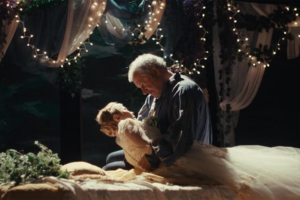Reviewed by GREG KING
Director: Aleksei Popogrebsky
Stars: Grigory Dobrygin, Sergei Puskepalis.
The setting for this grim and downbeat psychological thriller is a remote meteorological research station at the northern most tip of Siberia.
Pavel (Grigory Dobrygin, making his film debut) is a young graduate student gaining work experience. He is impetuous, impatient, irresponsible, technically clever, but he finds the work boring and repetitive, and he spends most of his down time listening to music on his I-pod or playing video games. He represents the new Russia. His colleague Sergei (Sergei Puskepalis) however is of old Russian stock – humourless, dedicated to his duty, obedient, and hard working. He has little time for Pavel’s easy going approach.
The pair are opposite in temperament and interests, but are thrown together in this dilapidated workstation for the summer. A father/son like relationship develops between the two, as Sergei tries to instruct Pavel in the basics of their task, which is basically collecting data. Their differences are also meant to represent the changing nature of Russia itself. Their only connection with the outside world is their daily two-way radio contact. But when Pavel takes a disturbing message from the mainland informing him that Sergei’s family has died in an accident he panics and fails to pass on the message. This leads to increased tension between the two and the atmosphere grows toxic.
Driven by guilt, Pavel misinterprets Sergei’s reaction to learning the devastating news. What follows is an extended chase across the frozen tundra.
Writer/director Aleksei Popogrebsky (Simple Things, Road To Koktobel, etc) takes great pains to establish the two characters, highlighting their differences. He also spends plenty of time exploring the harsh setting in largely dialogue free passages. He makes the most of the isolation and sense of fragility felt by the characters. The spectacular landscape in Chukotka almost becomes a third character in the drama. Pavel Kostomarov’s gorgeous wide screen cinematography is evocative, and he loves his long static establishing shots. Kostomarov hails from a background in documentary filmmaking and it shows in his visuals. In this vast snow covered wilderness, nature dwarfs man. The background sounds – the crashing of waves, the squawking of gulls, the static from the radio, and the howling wind – also enhance the drama.
Despite the wide-open spaces of the Arctic setting, this is still a very claustrophobic feeling film, given the air of slow building tension that develops between the two characters. The performances of the two leads are solid, and both actors shared the Silver Bear at the 2010 Berlin Film Festival.
Popogrebsky’s direction is slow and measured, and he beautifully captures the sense of tedium of the foreboding location. How I Ended This Summer is a psychological study of guilt and isolation, but the ending is almost anti-climactic. Unfortunately Popogrebsky’s approach to the material creates a distance with the audience, who will be frustrated by its real lack of drama.
★★★




